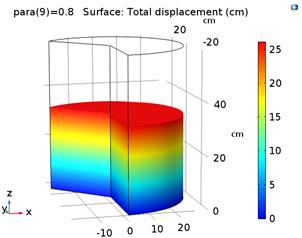
The United States has more than 3100 municipal solid waste (MSW) landfills, many of which practice leachate recirculation. Leachate recirculation leads to increase efficiency in leachate, biogas, and energy management. However, it creates complex thermal, hydraulic, mechanical, and biochemical (THMB/C) coupled processes inside the waste. MSW settlement and biogas generation depend on the interrelated processes, including temperature and saturation variations, and a fundamental understanding of these processes is necessary for effective landfill management and operation. A series of small-scale, large-scale water retention curve (WRC) and in situ tests were performed in this research. In the small-scale test, four containers were used to simulate bioreactor conditions. The MSW was sampled every 15 days to be tested for compressibility at 22, 45, and 78 °C. The results showed that a temperature of 78 °C increased compressibility by 17.6% on the last day. Also, the results indicated that advancement in biodegradation decreased the compressibility index by an average of 46%. To characterize MSW unsaturated properties, three main experiments were conducted using a modified hanging column test on a low and medium compacted sample. The results of WRC along with reported unsaturated properties in literature were used in slope stability analysis, and results showed that the parameters have a significant impact on the stability of MSW. Three sets of long-term, large-scale column tests were carried out to evaluate the THMB/C behavior, including biogas production, H2S concentration, leachate quality, settlement, and lateral earth coefficient subjected to leachate recirculation and increased temperature. The results showed that leachate recirculation and applied heat had a significant effect on the biological and mechanical response of MSW. Mainly, the settlement significantly increased at higher temperatures and saturation. The results were used to develop a settlement prediction model by considering the effect of saturation and temperature. Comparison of the model with laboratory and field data validated the applicability of the model. Finally, field tests by MIHPT and CPT in active and closed landfills obtained the vertical profile of the landfill for a variety of parameters. The findings showed that there is great potential for the use of direct-push tools to characterize MSW landfills effectively and at low costs. The findings of this research contribute to a more accurate, effective design and operational management in MSW landfills.
DEPARTMENT OF CIVIL AND ENVIRONMENTAL ENGINEERING